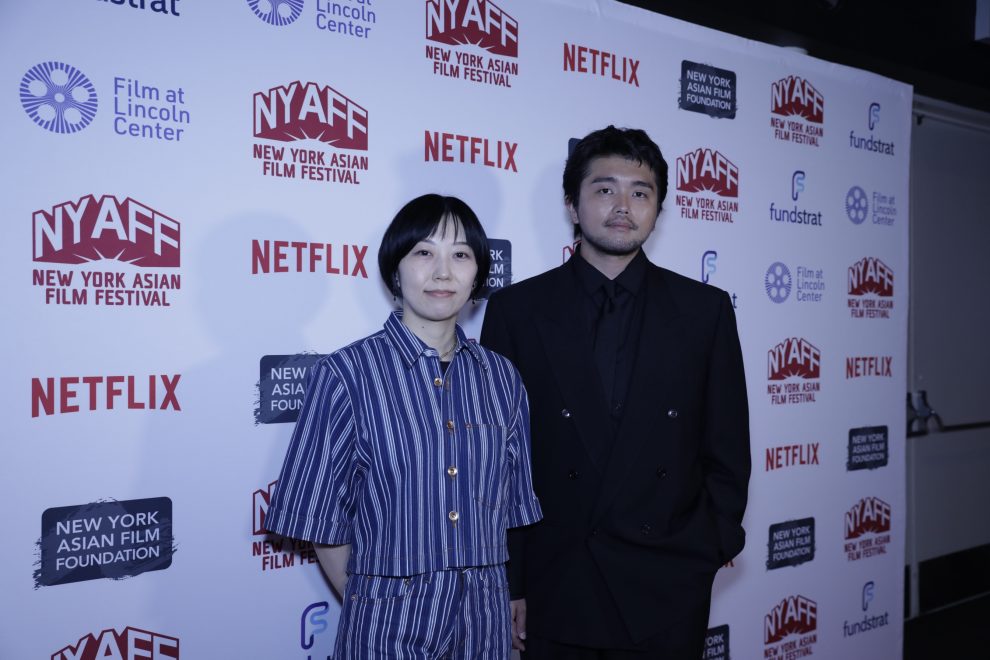Earlier this year, the film “In Her Room” (Japanese title: “Hitoribocchi Janai”), starring Iguchi Satoru of King Gnu, was released in Japan. Iguchi plays the role of Susume, a shy dentist who develops a strange relationship with a woman who lives in a lush, plant-filled apartment.
“In Her Room” is directed by Ito Chihiro, and is based on her novel of the same name. The film made its North American premiere last month at this year’s New York Asian Film Festival. Ahead of the film’s screening, I met with Ito and Iguchi to talk about the film.
*Warning: There are spoilers in this interview!*
Ito, why did you want the book to become a film? Why did you want to direct it?
Ito Chihiro: First, I’d like to talk about the original work, the book. I wrote this book like a diary, the diary of Susume, the main character. It was like his inner voice. I have been a screenwriter for a long time, and I tend to have a very little number of lines in my work. However, when I wrote the book, I wanted to make sure that I was adding in emotion by using this “inner voice.”
The reason I wanted to make the book into a film is because I wanted to challenge myself to express the “inner voice” in the book without words or facial expressions in the film. The main character isn’t very communicative. It was a challenge for me that I wanted to overcome. I wanted to convey his feelings without using a lot of words and facial expressions.
Are the book and film different in any way?
Ito: They are totally different! In the book, I explain what Susume is feeling by using the “inner voice”, so it’s almost like he’s speaking for real. In the film, he doesn’t talk much or show much facial expression. The audience watching the film decides what he’s thinking and feeling. If someone reads the book and watches the film, they’ll realize how different they truly are.
Iguchi, what made you want to take on this role?
Iguchi Satoru: I was very interested in this role because of the huge difference between the main character in the book and in the film. In the book, there are a lot of explanations of what he thinks and what he feels via his inner voice; but in the film, he hardly speaks or has facial expressions. I thought of how I could ever express that given this context. I wanted to take on this challenge.
Ito, you are a writer who became a director. Iguchi, you are a musician who became an actor. What are the creative differences you experience between your primary and secondary fields?
Iguchi: I don’t really see a lot of differences between the two. When I sing, there is a writer and composer who does their work, and I myself sing as a singer. When I’m acting, there is a screenwriter and a director who does their work, and I act as an actor. So I don’t really see a lot of differences.
Ito: In my case, they are completely different. When I write, I have to talk to the director, and write based on what he thinks or what his plan is. I have to think of what I can create, and how. But when I’m the director, I have to convey what I think to the film’s staff, and then try to stimulate them to see what they’re thinking. I then have to compile all this into one thing.
This is a difficult question. As I was watching the film, I kept thinking to myself, “Does Susume have a condition of some sort? What exactly is causing him to be so challenged when it comes to communication? Is he perhaps neurodivergent?” Was this something that was in the book that maybe wasn’t touched upon in the film?
Ito: I was really thinking of that. I tried to present someone who is very sensitive, and awkward, living in an urban setting. I do understand that there are some people who are diagnosed and that helps them to function in everyday life. However, I think he is a little bit different. He can act in different ways depending on who he is dealing with.
Iguchi: I used my own experiences, what I’m thinking and feeling in everyday life, with this character. He’s overly self-conscious and has a hard time communicating with other people, socially awkward. I myself feel these things at times. I don’t know how people here in New York would react, since it’s a different culture, but it’s pretty common in Japan. People are trying to assess how they can deal with human interactions and relationships.
Are there parallels between Susume’s relationship with his mother and his girlfriend Miyako?
Ito: There is a correlation. The theme of this movie is “womb”, a woman’s womb. It’s about going back into the womb. This is something I was trying to convey.
Now, I’m thinking of how the English title of the film, “In Her Room”, sounds like “in her womb.”
At the end of the film, Susume tells his mother and her partner that he is moving to Nagasaki. By going to Nagasaki, is Susume truly finding himself, or running away?
Ito: I was thinking about death. It doesn’t mean it’s the end of the world though. It’s like a rebirth. He’s trying to change his environment and the people surrounding him to start a new life, to relive his life. I think it depends on the audience to decide if that new life is going to be nice or not.
Iguchi: In my case, when he saw his mom and her partner, he wanted to live again, start again. I had the chance to go to Nagasaki this year in April after filming ended. It’s a beautiful city with a lot of hills. It has exotic buildings, it’s a beautiful city. I saw a post box next to a souvenir shop, and I thought of Susume picking up a postcard and writing on it and sending it to his mother. I envisioned that. So I think Susume was thinking of reliving his life, enjoying the next stage of his life.
Photo attached to this article is courtesy of New York Asian Film Festival.



















